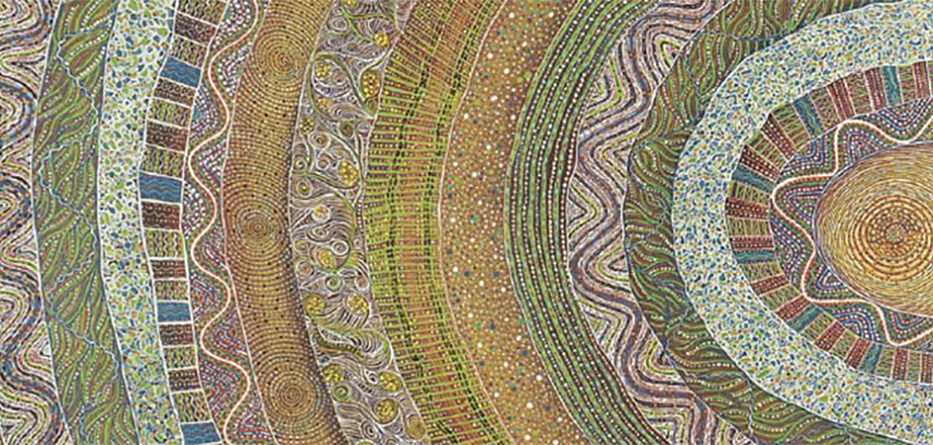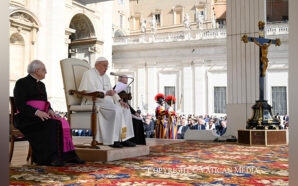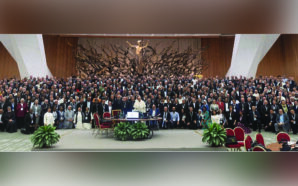Homily for the 3rd Sunday in Ordinary Time
Readings: Nehemiah 8:2-6,8-10; Psalm 18; 1 Corinthians 12:12-30; Luke 1:1-4;4:14-21
23 January 2022
On this third Sunday of Ordinary Time in Year C, we set out on our journey through the gospel of Luke. In today’s gospel, the writer introduces himself to the official named Theophilus so that he ‘may learn how well founded the teaching is that you have received’. The writer makes no claim to have known Jesus. He is writing about 50 years after the death of Jesus. He is a third generation Christian who having studied the accounts of eyewitnesses has decided to produce an ordered account.
Listen at https://soundcloud.com/frank-brennan-6/homily-23122
In today’s gospel, after the opening verses of the gospel explaining the writer’s purpose, we jump straight to chapter 4 when Jesus returns to Galilee after 40 days in the desert. He comes to Nazara where he had been brought up. He goes into the synagogue. He stands; he receives the scroll; he unrolls the scroll; he reads the scroll; he rolls up the scroll; he hands back the scroll; he sits down. We hear nothing of his preaching other than the declaration, ‘This text is being fulfilled today even as you listen.’ Jesus’s hearers heard that promise. Luke’s original audience heard that promise. And we hear that promise today. But what is it that is being fulfilled today? The words which Jesus read from the prophet Isaiah hold the key:
The spirit of the Lord has been given to me,
for he has anointed me.
He has sent me to bring the good news to the poor,
to proclaim liberty to captives
and to the blind new sight,
to set the downtrodden free,
to proclaim the Lord’s year of favour.
Scripture scholar Brendan Byrne makes the point that Luke’s gospel is not really a story about ‘back there’; ‘it is in some sense “our story” too’: ‘The hopes and longings for liberation voiced by characters in the Gospel remain our hopes today. Like them, we stand between promise and fulfilment. The day of salvation is “far spent”, but it is by no means fully achieved.’[1]
This coming week we mark Australia Day on 26 January, the anniversary of the day that Governor Phillip came ashore at Sydney Cove hoisting the flag of the colonisers, marking the great caesura in human history on this land. Fifty years ago, we Australians were starting to come to terms with the Aboriginal dispossession and claims to Aboriginal land rights. The Northern Territory Supreme Court had determined that Aborigines in Arnhem land had no rights to their lands, even though no one else lived there or ever had. Prime Minister Sir William McMahon had made a very inadequate response to the demonstrated shortfall in Australian law, telling Aborigines in the lead up to Australia Day 1972 that they could apply for leases over vacant lands ‘to provide for economic and social purposes’ – as if it were not already their land and never was.
Aboriginal activists from Redfern were very unimpressed with the prime minister’s announcement. Four of them drove down to Canberra on Australia Day and planted an umbrella adorned with the sign ‘Aboriginal Embassy’ on the lawns in front of Parliament House. The police came by and were told that the Aborigines were protesting until the government granted land rights. The police remarked that this ‘could be forever’. Michael Anderson, one of the Aboriginal leaders of the protest, told The Canberra Times, ‘As soon as they start tearing up Arnhem Land we’re going to start tearing up bits of Australia … the land was taken from us by force … we shouldn’t have to lease it … our spiritual beliefs are connected with the land.’[2]
In the lead up to the 50th anniversary of the establishment of the Aboriginal Tent Embassy we have witnessed the extensive fire damage to the old Parliament House. We don’t know all the facts about who was responsible for this wanton damage to one of the nation’s iconic buildings. In times of such social disruption and dissonant narratives, how do we bring good news to the poor, liberty to captives, new sight to the blind, and freedom to the downtrodden?
After the first session of the Australian Catholic Church’s Plenary Council in October last year, the convenors reported: ‘We are invited to study and learn with our Indigenous brothers and sisters as they continue their synodal journey to and from the Uluru Statement of the Heart, and take action to continue resolving the “unfinished business” of reconciliation in this country.’[3] The Uluru Statement calls for ‘the establishment of a First Nations Voice enshrined in the Constitution’[4]. During the week, Noel Pearson the original proponent of a Voice to Parliament reminded radio listeners that it was John Howard on the eve of the 2007 election who kicked off the process of constitutional recognition of Indigenous Australians. Howard had said: ‘My goal is to see a new Statement of Reconciliation incorporated into the Preamble of the Australian Constitution. If elected, I would commit immediately to working in consultation with Indigenous leaders and others on this task.’[5]
But that is no longer enough for our Indigenous leaders. Noel Pearson was very critical during the week of the latest proposal from the Australian Republican Movement which acknowledged ‘that it may be appropriate to include a preamble at the beginning of the body of the Constitution’[6]. Indigenous leaders want more than a statement of symbolic words. Pearson explained the way forward in these terms: ‘I think the conservatives will have to take Ken Wyatt’s blueprint for a legislated voice and then move to the question of: right we now know what kind of voice, what this voice will look like in legislation, now we need a new constitutional hook inserted into the Constitution on which we can hang this structure of the voice’[7].
Together we need to work for this hook which will be more than symbolic words. When Pope John Paul II met with Aborigines and Torres Strait Islanders at Alice Springs in 1986, he said, ‘The establishment of a new society for Aboriginal people cannot go forward without just and mutually recognized agreements with regard to these human problems, even though their causes lie in the past. The greatest value to be achieved by such agreements, which must be implemented without causing new injustices, is respect for the dignity and growth of the human person.’[8]
We Catholics, whether Indigenous or not, could contribute in two ways to facilitate the establishment of this new society in which Aborigines and Torres Strait Islanders are assured their place at table when laws are made affecting them and their heritage. First we could use whatever influence we have with friends and associates to convince our fellow citizens that constitutional recognition is desirable. In a democracy, elected politicians, especially in an election year, do like to follow the lead of the people when a proposal is popular. Second we could marshal the arguments to convince members of the more conservative political parties that they should be aboard. That might include suggestions of constitutional reform which search for a match between Indigenous aspirations and Liberal-National Party philosophical constraints. Unless these steps are taken, there is no point whatever in proceeding with a referendum. Terms like ‘voice’ and ‘hook’ are not refined constitutional terms. That’s why we need to build trust being attentive to the aspirations behind ‘the Voice’ and ‘the hook’, being constructive with suggestions which might match the images of voice and hook.
Instead of allowing the Commonwealth Parliament to make laws with respect to ‘the people of any race for whom it is deemed necessary to make special laws’, we might consider a power to make laws with respect to ‘Aborigines and Torres Strait Islanders for whom it is deemed necessary to make special laws after consultation with them’ There could then be added the hook of which Noel Pearson speaks. For example, a new section 127 could provide: ‘There shall be an Aboriginal and Torres Strait Islander Commission with such structure and functions as the Parliament deems necessary to facilitate prior consultation to the making of special laws with respect to Aborigines and Torres Strait Islanders.’
Whatever the politics and legal complexity, this Australia Day, let’s maintain hope and trust despite adverse signs like the fire damage to the old Parliament House – damage which pains many Indigenous Australians as well as many of us who are not.
Your words, Lord, are Spirit and life.
The law of the Lord is perfect,
it revives the soul.
The rule of the Lord is to be trusted,
it gives wisdom to the simple.
Your words, Lord, are Spirit and life.
The precepts of the Lord are right,
they gladden the heart.
The command of the Lord is clear,
it gives light to the eyes.
Your words, Lord, are Spirit and life.
[1] Brendan Byrne, The Hospitality of God, St Pauls, 2000, p. 8
[2] Quoted in Frank Brennan, No Small Change, University of Queensland Press, 2015, p. 153
[3] Plenary Council, First Assembly Proposals from Small Groups and Individual Members,
December 2021, p.9, available at https://plenarycouncil.catholic.org.au/keydocuments/
[4] Uluru Statement from the Heart, available at https://ulurustatement.org/the-statement
[5] John Howard, Address to the Sydney Institute, 11 October 2007, available at https://parlinfo.aph.gov.au/parlInfo/download/media/pressrel/L41P6/upload_binary/l41p62.pdf;fileType=application%2Fpdf#search=%22media/pressrel/L41P6%22
[6] The Australian Republican Movement, The Australian Choice Model, 2022, p. 18
[7] Noel Pearson on ABC Mornings with Virginia Trioli, 20 January 2022 available at https://www.abc.net.au/radio/melbourne/programs/mornings/mornings/13704870
[8] Pope John Paul II, Address to Aborigines and Torres Strait Islanders, 29 November 1986, #11 at https://www.vatican.va/content/john-paul-ii/en/speeches/1986/november/documents/hf_jp-ii_spe_19861129_aborigeni-alice-springs-australia.html








